Climate crisis, consumerism changes and the increase in demand during the Corona pandemic period – All constitute challenging changes as well as an opportunity for the world of design.
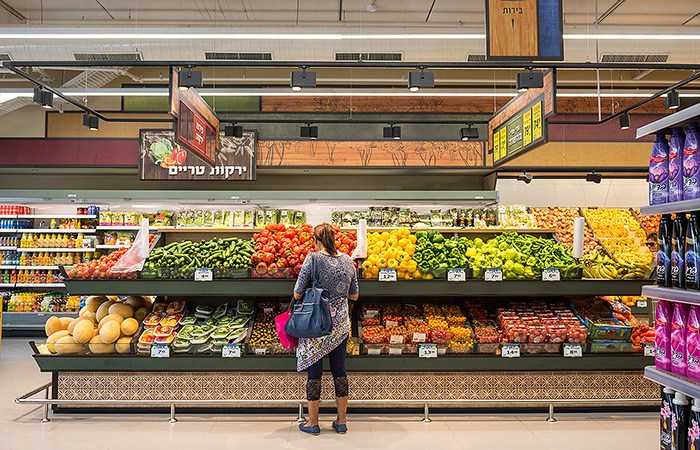
Time and time again, supermarket design is called to step up to new challenges – the introduction of online shopping, the cost of living, climate crisis and now, the Corona pandemic. Unlike other fields which were significantly affected by the current crisis, the operation of food chain stores is more vital than ever, they are merely required to reinvent themselves, improve and change. The climate crisis meets supermarkets head on – many of the most burning issues are related to food stores – high energy consumption of air conditioning systems and refrigeration, animal products and all it entails, plastic packaging, over consumption, food waste and more.
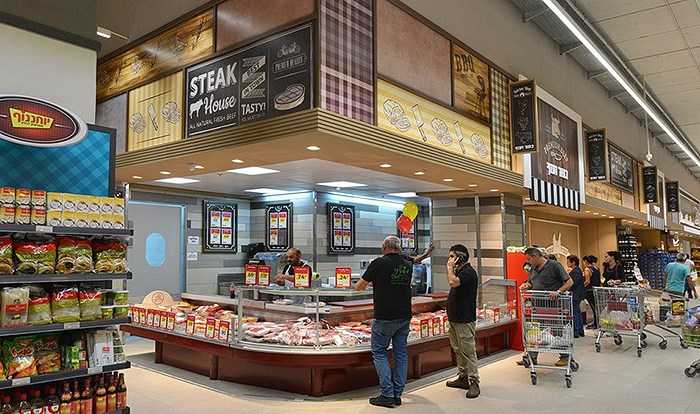 Yochananof Rehovot Branch, the butcher's section[Photo by: Aviv Kurt]
Yochananof Rehovot Branch, the butcher's section[Photo by: Aviv Kurt]World leading food retailers have already taken action voluntarily and in full force, not waiting for governmental or municipal regulation.
Investments are made in green building, energy efficient systems, reducing plastic packaging, enacting standards and regulation to reduce pollution and emissions throughout the supply chain, making information accessible to the customer in order to influence sustainable food consumption, enabling bulk sales in order to reduce waste and food waste, introducing “imperfect” fruit and vegetables in stores to be sold at a discount, and more. In European countries it’s for reasons of complying with consciously minded consumer demands, pressure from environmental organizations, ESG Funds’ standards (corporate liability), preparing for future regulation, as well as from the desire to do the right thing to strengthen their image and relationships with the community.
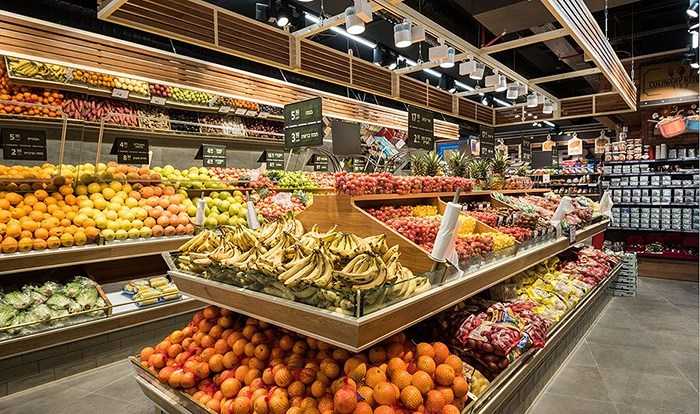 Bullmarket Or Yehuda, Vegetable section[Photo by: Aviv Kurt]
Bullmarket Or Yehuda, Vegetable section[Photo by: Aviv Kurt]Indeed Israel is behind, although even here there is an increase in awareness and the first signs of legislation on issues such as the Plastic Bags Act, marking healthy foods, and the green building standard which will become mandatory in commercial spaces as of next year, have begun to take effect. Civilians are beginning to solidify awareness against the use of disposable plastic (pressure to remove such materials from kindergartens, legislating against bringing it into beaches, etc). These trends will have a direct effect on supermarkets.
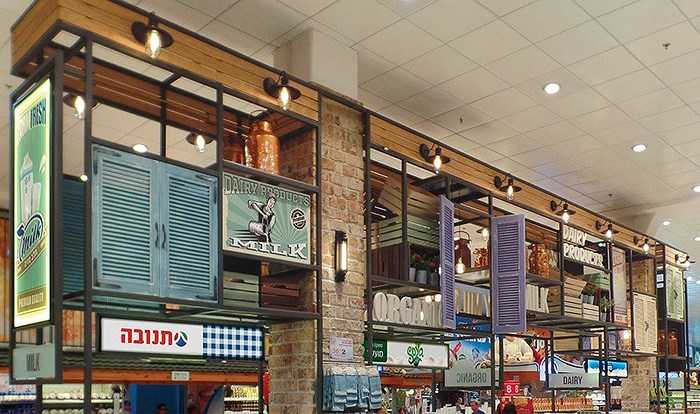 Hatzi Hinam Rishon Le'zion, Dairy substitutes category, making use of recycled and readymade materials.
Hatzi Hinam Rishon Le'zion, Dairy substitutes category, making use of recycled and readymade materials.Recent trends in urban planning talk of mixed uses (residential, employment, commerce and services within a walking distance from each other), which have proved essential during the Corona crisis under movement restrictions. Neighborhood branches will be prioritized, saving the need to travel out of town, since when the branch is easily accessed there is a an opportunity to make smaller purchases and waste less food. Professional and careful planning and design are able to accommodate the contents of a large supermarket even in a smaller area, without compromising the shopping experience.
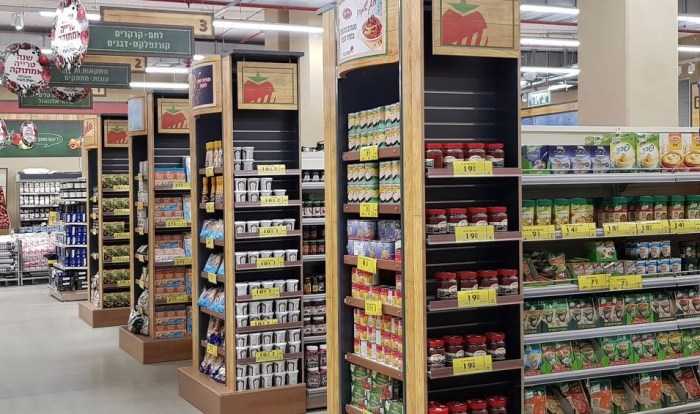 Shuk City Main branch - Three sided gondola ends and the option of interchangeable top signage, instead of temporary promotional display fixtures
Shuk City Main branch - Three sided gondola ends and the option of interchangeable top signage, instead of temporary promotional display fixturesThe world of raw materials for the interior design of a store is being innovated with alternatives of naturally-based materials, recycled materials, recyclables and as such, as well as paints, glues and non-toxic finishing materials, the production of which is less harmful. In Israel their cost is often high, however one must hope that with the increase of awareness and demand it will be reduced in the future. Beyond materials, it is important to adopt a circular way of thinking within the planning and design processes, it is possible to switch to dry adhesion (without adhesives), and to consider in advance the future dismantling and separation into reusable raw materials or recycling at the end of the product’s shelf life. We are accustomed to see promotional fixtures and aids for advertising promotions and for launching new products in supermarkets, mostly made from cardboard, plastic and sometimes metal – which last for several months only and produce a great deal of waste. It is preferable to plan permanent fixtures to address the needs of interchangeable signage and various advertisements, and by doing so, reduce the use of resources and waste.
 Selling by refill of – olive oil, water and detergents, Budgen's chain of stores, London
Selling by refill of – olive oil, water and detergents, Budgen's chain of stores, LondonIn Israel we are used to buying fruit and vegetables, pickles, spices, seeds and nuts in bulk, compared to many countries overseas where the produce is packed in plastic which produces harmful waste. In recent years, there has been an increased awareness around the world for the benefits of selling other products in bulk as well, when stores offer customers reusable containers for filling or even enabling the use a container brought from home (The container is weighed first, and the customer pays only for the goods). Under the trend of ‘Zero Waste’, in special stores it is possible to also fill reusable containers with water, olive oil, almond milk, detergents, washing powder and more. Discarding the packaging reduces the price for the customer, and the manufacturer and retailer benefit as well. The environmental gain is double – we have saved on packaging waste, and bought exactly the right quantity we need, avoiding any surplus which will go to waste. The Corona crisis may impact bulk sales for reasons of hygiene concerns, however interim solutions can be found such as covering the merchandise, placing sneeze screens around the merchandise or switching to sales using designated dispensers.
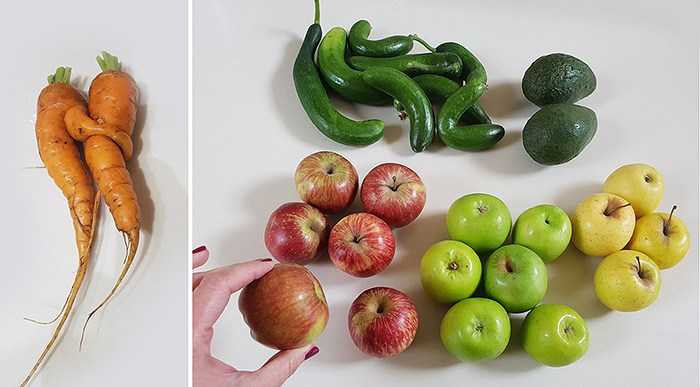 Fruit and vegetables which do not meet the standards of color, shape and size
Fruit and vegetables which do not meet the standards of color, shape and sizeDuring the Corona lockdown, the consumers’ anxiety led to unprecedented demands for basic products, excessive stockpiling purchases and to a significant increase in online shopping, which in the food sector did not characterize the Israeli market up until now. Since only the food stores and pharmacies were open during the lockdown period, stores which have a homeware department and other goods could continue to sell these products while the other stores were closed. We are probably facing an economic recession, many households will search for ways to save and reduce costs. Perhaps it is an opportunity to sell “imperfect” fruit and vegetables in Israel as well (the kind that do not meet the store’s standards of shape, size and color). Many supermarkets around the world are offering such produce at a discount of about thirty percent, which means that consumers are able to buy agricultural produce which does not fall short in taste or nutritional value, at a lower cost. This is how we save on the loss of resources throughout the production process, and on the emission of greenhouse gasses resulting from dumping the produce into the trash. Introducing this type of merchandise into supermarkets requires proper branding which will not display the product as being of lower grade, together with having a well designed sales environment.
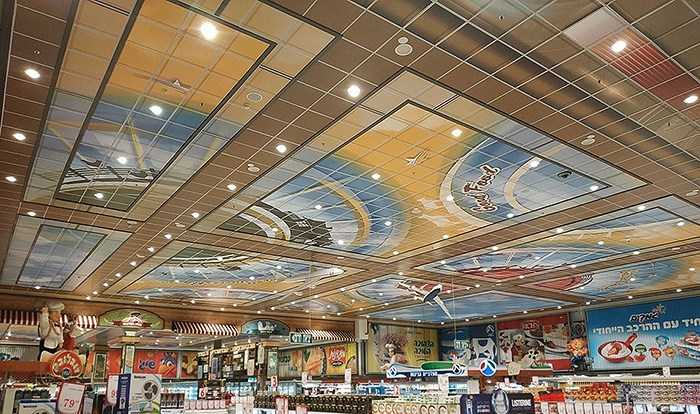 Hatzi Hinam - Rishon Le'zion, a ceiling over the refrigeration areaAchieving an impressive visual effect using graphic design only, the chain invested in quality and cost-effective lighting
Hatzi Hinam - Rishon Le'zion, a ceiling over the refrigeration areaAchieving an impressive visual effect using graphic design only, the chain invested in quality and cost-effective lightingDuring the crisis, supermarkets in Israel have demonstrated commitment to customers, pulling together to provide a response at unusual hours by increasing the number of personnel on duty, organizing quickly to meet the regulations imposed upon them by the Ministry of Health, and by having the ability to apply pressure on sub-suppliers to guarantee available stock. They have the power to change and improve efficiently and swiftly. Consumers also hold a significant impact by creating demand and changing their shopping habits –The ‘Cottage cheese protest’ proved this in the past. As customer awareness increases beyond the issue of price, there will be a chance for dialogue which will advance the supermarkets on the environmental issue as well.